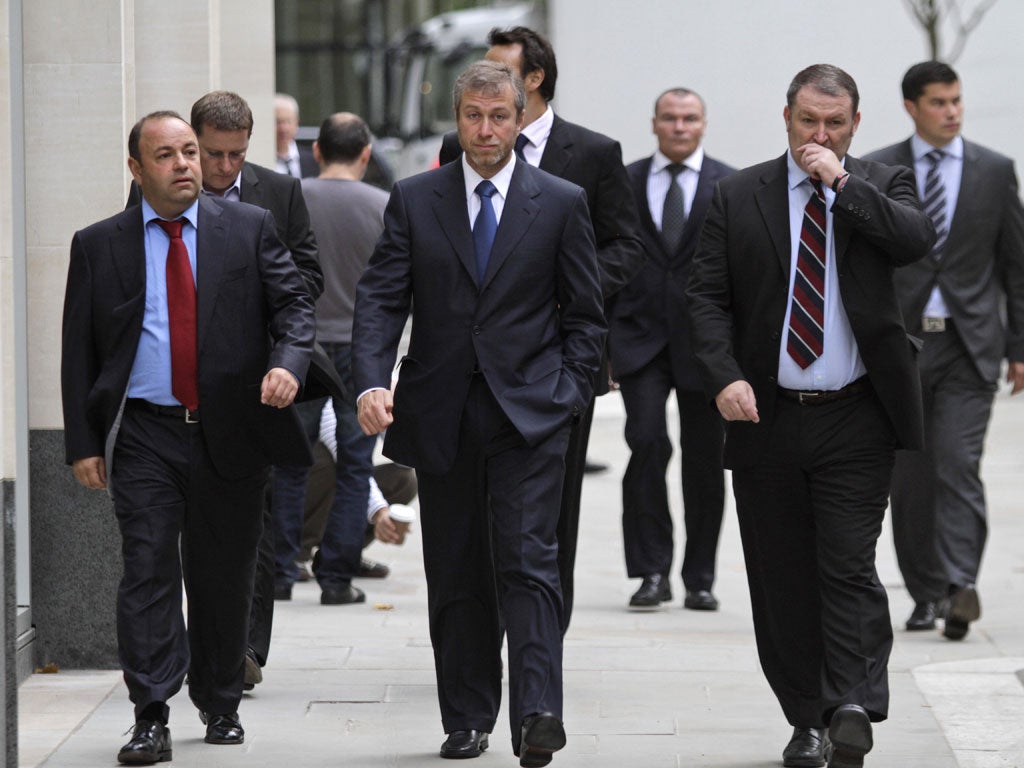
Chelsea Football Club owner Roman Abramovich today told a High Court judge that allegations he betrayed a Russian business rival were "wholly without merit".
Mr Abramovich, 45, is being sued for billions of pounds by exiled Russian oligarch Boris Berezovsky, 65, in a trial before Mrs Justice Gloster at the Commercial Court in London.
Mr Berezovsky says the Russian billionaire businessman "betrayed" him and "intimidated" him into selling shares in Russian oil company Sibneft for a "mere 1.3 billion" US dollars (£800 million) - "a fraction of their true worth".
He alleges breach of trust and breach of contract and is claiming more than £3 billion in damages.
However Mr Abramovich said he owed Mr Berezovsky nothing in "law or honour".
"I would respectfully hope that it will be apparent to this court that Mr Berezovsky's claims are wholly without merit," said Mr Abramovich, in a written witness statement given to the judge.
"Mr Berezovsky has already obtained a very substantial sum of money from me and I do not believe that he has any entitlement to be paid anything more, whether in law or honour."
He says Mr Berezovsky was paid millions of pounds for his services as a "political godfather" but was not a business partner.
The court has heard that Mr Berezovsky "fled Russia, never to return" in late 2000, following a fall-out with then president Vladimir Putin - travelling initially to France then settling in England.
Mr Abramovich gave evidence at the start of his defence case as the trial entered its fifth week. He is expected to be in the witness box for several days.
He gave evidence in Russian and his words were translated into English.
Mr Abramovich told the court how "we could be accused" of "backdating documents", and said certain documents created during the multibillion-pound legal battle had been "signed two days early".
But he denied falsifying documents and said no one close to him had "ever faked a document".
Mrs Justice Gloster heard that Mr Abramovich had been arrested - then released - in Russia in 1992 after being accused of the creation of false documents.
"I have never falsified any documents," Mr Abramovich told the judge. "None of the people close to me has ever faked a document."
He added: "If backdating documents is something that is not very ethical, then perhaps we could be accused of that.
"This practice existed in Russia and, for sure, we must have done it.
"In the course of this case we say that certain documents have been signed two days early, or not."
Laurence Rabinowitz QC, for Mr Berezovsky, asked Mr Abramovich if he was aware of this happening. Mr Abramovich replied: "Yes, I was."
Mr Abramovich said he had been arrested in 1992. Mr Rabinowitz said the accusation was the creation of false documents.
"The refinery discovered that they didn't get their money," said Mr Abramovich.
"I was under arrest, they received money, I was released. There was no problem, there was no hearing. A criminal case was dropped because of no crime."
The judge was told how Mr Abramovich met Mr Berezovsky in 1994, and Sibneft was created out of former state oil firms the following year.
Mr Abramovich, who told the court that he "acquired" Chelsea in 2003, said he was "not a well established business person" when he met Mr Berezovsky and added: "I created little noise around myself."
Mr Abramovich said in the witness statement that he "felt a strong emotional bond" to Mr Berezovsky but "hesitated to call him a former friend".
He said: "I was not his protege and he was not my mentor. I was quite surprised by his extravagant lifestyle and even respected him for that. However, I was never interested in imitating this lifestyle."
Mr Abramovich said Mr Berezovsky was a "'big ideas type of man".
He said Mr Berezovsky "constantly" needed money to fund political ambitions and wanted to be perceived as "one of the richest and most influential individuals in Russia".
"(Mr Berezovsky) always had far-reaching political ambitions," added Mr Abramovich.
"There was at times something of a megalomaniac about him that could lead to fantastic suggestions on his part.
"As an example, one of his ideas was to restore monarchy in Russia.
"The grander the plan he entertained at any given time, the more cash he would be after in his almost-fanatical zeal to seek to make those grand plans a reality."
Mr Abramovich said he had been given advice - from a "legal training" consultancy called Bond Solon - on how to give evidence in court.
"They told us that you have to breathe slowly and that you have to look at the judge," said Mr Abramovich. "There is a certain etiquette."
The hearing continues.
PA
Subscribe to Independent Premium to bookmark this article
Want to bookmark your favourite articles and stories to read or reference later? Start your Independent Premium subscription today.
